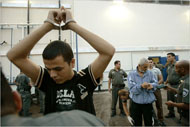
This week, a prisoner swap for years in the making finally came to fruition on October 11 between Israel and Hamas. For captured Israeli soldier Gilad Shalit, held in the Gaza Strip since June, 2006, 1,027 Palestinian prisoners will be released from Israeli jails.
Hamas politbureau Chief Khaled Meshaal announced the swap at a press conference in Damascus, saying the deal – finalized with Egyptian mediation – would be implemented in two phases. In the first phase, which is most likely to take place on October 18, 450 prisoners including 27 women will be released concomitantly with Gilad Shalit who will be first transferred to Egypt. In the second phase, two months later, the remaining 550 prisoners will be released.
Of the 450 prisoners, 110 will return to their homes in the West Bank including 55 lifers; 131 prisoners will return to their homes in the Gaza Strip. The remaining prisoners are being released from jail but will not be allowed to return home; 163 prisoners from the West Bank and Jerusalem will be exiled to the Gaza Strip and over 40 prisoners will be exiled abroad. In total, 315 prisoners serving life sentences will be set free.
The second phase will include 550 prisoners of Israel’s choosing, although it has said they would be political and not criminal prisoners.
The prisoner exchange was announced with much fanfare by Hamas and with cautious joy by others among the Palestinians who were unhappy with the terms of release for many of the prisoners and the fact that high profile prisoners such as PFLP leader Ahmad Saadat and Fateh leader Marwan Barghouti were not included in the release.
While Hamas has agreed to release Shalit, it has not agreed to disclose any information on his whereabouts. On October 14, one of the groups responsible for Shalit’s capture, the Popular Resistance Committees, said the soldier’s location and circumstances surrounding his capture would not be revealed after the exchange is finalized.
Meanwhile, hundreds of Palestinian prisoners entered their 19th day of hunger strike, some whose health is reportedly deteriorating. The prisoners, who began their strike on September 27, are protesting poor and cruel conditions, including solitary confinement, lack of medical care, shackling during trial and sparse family visits. Hundreds of solidarity tents have gone up in various Palestinian districts and youth groups have joined the hunger strike alongside the prisoners.
On the ground, Jewish settlers continued to attack Palestinian homes and properties throughout the week in what they call “price-tag” attacks.
On October 14, Israeli settlers from the settlement outpost of Nira in the central West Bank set fire to 120 olives trees belonging to farmers in the village of Ras Karkar. In Salfit in the northern West Bank, area-settlers set fire to 300 Palestinian olive trees.
Furthermore, on October 14, the Israeli army blocked residents of Nablus-area villages from picking their olive trees, which are in close proximity to Israeli settlements. According to Maan News Agency, Israeli troops told harvesters from the villages of Qaryut and Azmut that the Palestinian-Israeli “security coordination” had expired and then blocked them from picking olives.
According to international activists accompanying the farmers, Israeli forces in Burin told them that the area was a closed military zone and subsequently barred them from the harvest.
"There are dozens of olives on the top of the hill (near the Israel settlement of Yitzhar)," one activist said, "but villagers were only given four days permission to do two weeks' work."
Settler price tag rampages were not only limited to Palestinian property this week. Following the news of the prisoner exchange, right wing Israeli Shvuel Schijveschuurder vandalized the memorial of assassinated Israeli Prime Minister Yitzhak Rabin, spray painting the words “price tag” and “release Yigal Amir” (Rabin’s assassin) on the memorial stone. Schijveschuurder was protesting the release of two Palestinians said to be responsible for the 2001 attack on the Sbarro restaurant in west Jerusalem in which he lost his parents and three siblings. According to Schijveschuurder, the Shalit family “traded Israel for their son.”
In other news, on October 11, the Israel Lands Administration published a plan for the east Jerusalem settlement of Givat Hamatos. The plan calls for building 2,610 housing units, which would constitute the first new settlement in east Jerusalem for 14 years. Givat HaMatos lies within Bethlehem's original municipal borders and will cut off from the West Bank from east Jerusalem destroying any possibility of a territorial solution in Beit Safafa and Shurafat," according to Peace Now.
On October 14, UN Secretary-General Ban Ki-moon criticized Israel for its plan to build 2,600 housing units in east Jerusalem, saying further settlement activity was "unacceptable."
"The Secretary-General is deeply concerned at continued efforts to advance planning for new Israeli settlements in occupied East Jerusalem," Ban's press office said in a statement.
"The Secretary-General reiterates that settlement activity in East Jerusalem and the remainder of the West Bank is contrary to international law," the statement said, adding such activity "must cease."
A few days earlier, on October 11, Israeli Prime Minister Benjamin Netanyahu announced he was seeking ways to legalize settlement building – namely outposts – on what he called “private Palestinian land” as opposed to the so-called “state land” which is also within the 1967 borders.
On October 10, 22- year old Ahmad Al Azazmeh from Beit Hanoun was killed when an Israeli missile shell hit him while he was planning a military operation against occupation forces in the area. The Democratic Front for the Liberation of Palestine said Al Azazmeh was a member of its military wing.
Finally, in the ongoing battle to win full membership recognition in the United Nations, Fateh veteran Nabil Shaath said on October 10 that the PLO has obtained the nine necessary votes from the Security Council needed. He said Gabon, Bosnia, Brazil, India, Lebanon, Nigeria, South Africa, China and Russia all told the Palestinians they would vote for them when the issue of statehood is broached in the Security Council.






